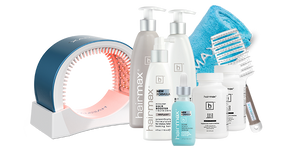Menopause, is when a woman’s body makes a natural shift from more-or-less regular cycles of ovulation and menstruation to permanent infertility. Hair loss is a common and upsetting menopausal symptom which can cause women to suffer a loss of confidence and self-esteem. Understanding why hair loss during menopause and being aware of treatment options will help you take action to treat the condition and help restore your hair health.
Androgenetic alopecia (AGA) also called female pattern hair loss, involves a diffuse reduction in hair density, but unlike men with male pattern baldness, the frontal hairline is retained. As many as 10 percent of pre-menopausal women reportedly have some evidence of androgenetic alopecia; however, the incidence increases greatly in menopausal women. As many as 50-75 percent of women 65 years or older may be affected by androgenetic alopecia [1,2].
- Feinstein, RP. Androgenic Alopecia. Emedicine http://www.emedicine.com/derm/topic21.htm
- Norwood OT. Incidence of female androgenetic alopecia (female pattern alopecia). Dermatol Surg. 2001 Jan;27(1):53-4.
What is hair loss during menopause?
Many people assume that androgenetic alopecia or pattern hair loss is a condition that mostly affects men, but what is less well known is that all women experience some degree of hair loss and thinning during menopause. The most common evidence of this hair loss is noticeable hair thinning, which is a loss of hair density where the scalp can be seen through the hair. However, while hair loss during menopause in women can sometimes be severe, it almost never results in complete baldness.
Due to the fact that excessive hair loss during menopause can affect a woman’s self-esteem and feelings of self-worth, it is vital to know that it can be dealt with successfully.
What causes hair loss during menopause?
Hair loss from androgenetic alopecia during menopause is usually a direct effect of fluctuating hormone levels. The cause of excessive hair loss during menopause varies depending on the individual, but generally is triggered from this hormonal imbalance. There are two main hormones are involved in hair growth in women, estrogen and testosterone. Estrogen helps hair grow faster, and stay on the head for a longer duration, leading to thicker, healthier hair. In estrogenic alopecia, the most common type of hair loss for menopausal women, this loss is directly attributed to a fall in estrogen levels. Estrogen helps hair grow faster, and stay on the head for a longer duration, leading to thicker, healthier hair, so a reduction in production of estrogen by the body leads to thinning and hair loss.
Estrogen is not the only hormone that comes into play with the issue of menopausal hair loss. Testosterone (which women have in minute quantities in their body) converts to dihydrotestosterone or DHT with the aid of the enzyme Type II 5-alpha reductase, which is held in a hair follicle’s oil. DHT appears to bind to hair follicles and force them to go into their “resting” phases, or telogen, sooner than is normal, shrinks the hair follicles and causes the new hairs to grow into fine, wispy, vellus hair with each cycle of hair growth.
What can effectively treat thinning hair and hair loss during menopause?
There is only one drug, minoxidil which is FDA approved for treating androgenetic alopecia (pattern hair loss) in women and only one non-drug option, the Hairmax Laser Devices with FDA clearance for treatment of female pattern hair loss and the promotion of hair growth.
Minoxidil is an over-the-counter (nonprescription) medication is approved for the treatment of androgenetic alopecia in men and women. Minoxidil is a liquid or foam that you rub into your scalp twice daily to grow hair and to prevent further loss. This can be messy and time consuming.
The Hairmax Laser Devices are a non-prescription home-use laser phototherapy medical device is easy and convenient to use that only requires treatment 3 times a week for 8- 15 minutes per session. The Hairmax is the ONLY home-use device of its kind that has FDA marketing clearance and clinical proof of efficacy for the treatment of androgenetic alopecia and the promotion of hair growth in both men and women*.
*Hairmax Laser devices are indicated to treat Androgenetic Alopecia, and promote hair growth in males who have Norwood Hamilton Classifications of IIa to V and in females who have Ludwig (Savin) I-4, II-1, II-2, or frontal patterns of hair loss and who both have Fitzpatrick Skin Types I to IV.












